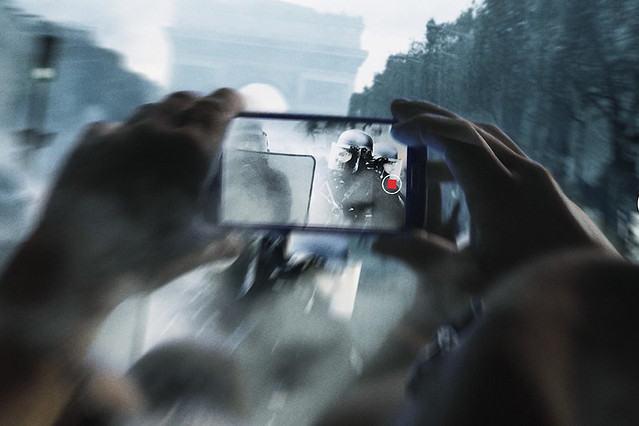 The Monopoly of Violence is showing as part of Big Screen Summer: NYFF58 Redux at Film at Lincoln Center. The series is sort of making up for the lost times- because of Covid shutdown, the New York Film Festival held only virtual screenings last Fall. The redux includes many of festival titles, including this film. It is currently playing at the Lincoln Center's Walter Reade Theater.
The Monopoly of Violence is showing as part of Big Screen Summer: NYFF58 Redux at Film at Lincoln Center. The series is sort of making up for the lost times- because of Covid shutdown, the New York Film Festival held only virtual screenings last Fall. The redux includes many of festival titles, including this film. It is currently playing at the Lincoln Center's Walter Reade Theater.
In the middle of the new, very timely French documentary The Monopoly of Violence, directed by David Dufresne, academics talk about the power shift or equilibrium of the playing field between the French National Police and the protesters with the proliferation of representation with the smart phone videos and social media. The documentary footage is mostly assembled from smart phone footages from protesters.
Violent protests in the streets in France are not new. The modern France, born out of a revolution, general strikes and student protests, which shuts down the country for months, have been regarded as normal occurrences. After all, France is an exemplary Western democracy where everyone can freely express himself or herself. Or is it?
The Monopoly on Violence takes a hard look at the police violence captured on camera during gilets jaunes (The Yellow Vest) movement - a nationwide populist movement which started as protesting the rise of fuel costs, high cost of living and Macron government's tax reforms which is seen as favoring the very rich, which started in 2018.
Does maintaining public order in a republic equals use of violence? This is the heart of the question of the film. Against the smartphone-captured videos projected on a giant screen, French academics, politicians, philosophers, protesters and police offer their reactions to the images that are playing out. "The State claims monopoly of the legitimate use of physical force," said Max Weber, an influential German Socioligist in 1919. But what happens if the legality of the power exercised by police becomes illegitimate with abuse, captured by ever-present smart phones? Yes there should be context to the images, and yes there are violence perpetuated by protesters as well. But there's an undeniable truth in a footage where young people are cornered and bludgeoned with clubs by police. A lot of protesters lost eyes, limbs and even their lives.
Many of the interviewees wear eye patches and glasses obscuring their eyes shot out by tear gas canisters or rubber bullets. They see the images of themselves being struck, bleeding profusely and talk about it. Their family members or friends talking about them being hurt on camera makes them emotional. Yellow Vest, born out of frustrations against economic inequality, doesn't have that romantic notion of the May 68'. The systematic violence and brutality is all about instilling fear and power play, more than anything else. Some of them admit that damaging property, holding out that broken corporate logo gives you a sense of power (by wounding its pride), however fleeting.
Finger pointing, as we've seen on mainstream media and heard from rightwing pundits about BLM protests here, towards protesters as if they are the sole perpetrators of these violence, as one of the academics points out, is misleading, as there are three types of violence which are all entwined:
1. Institutional violence (State violence), 2. Revolutionary/reactionary violence (protests) and 3. Repressive violence (police). You can't only point out the violence perpetuated by protesters because it means you are not recognizing the other two.
The Monopoly of Violence ends with the analysis of Macron and Putin meeting where Putin jabs on Western democracy by pointing out all the riots in the streets of Paris. Macron angrily retorts that only in democracy people can protest in the streets. So we have only two choices? Either we live in Minority Report style police state of Russia or China where they curtail protests preemtively, or state violence prone, chaotic, capitalist Western style democracy?
As we witnessed in BLM movement and its urging for the police reform and community policing, for the sake of the younger generation, one would hope another way is possible. I think the film is an exemplary in reflecting these thoughts after one of the most violent and prolonged civil unrests in France's modern history. And I hope we can learn from that.